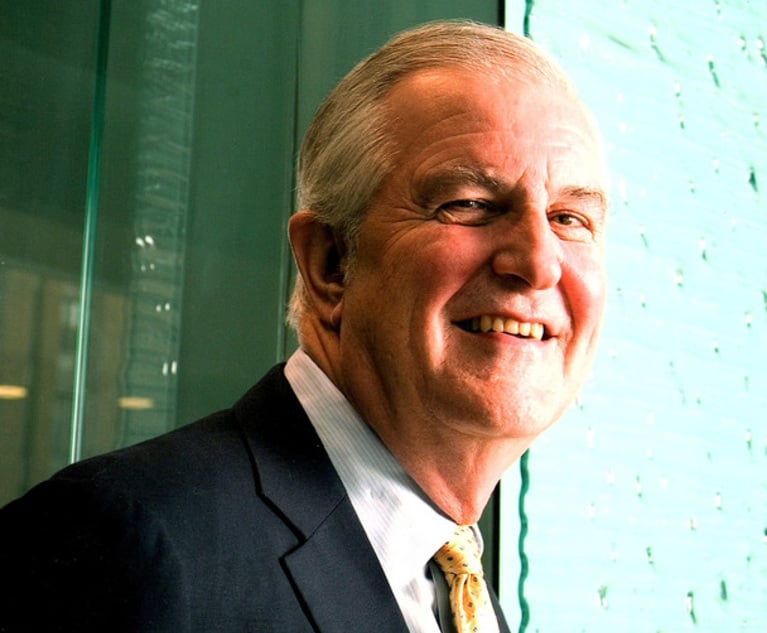 (Courtesy photo)
(Courtesy photo)Bryan Cave Leighton Paisner Sees Returns Dip in First Full Year After Combo
But firm leaders on both sides of the Atlantic said that factoring in BCLP's performance in the final nine months of 2018, the post-merger picture was more than encouraging.
March 18, 2020 at 05:00 AM
4 minute read
In its first full year since it was created via a trans-Atlantic merger, Bryan Cave Leighton Paisner saw revenues dip slightly to $869.1 million.
That's down 3.4% from the $899.4 million the firm reported for 2018, when the combination between St. Louis-based Bryan Cave and London-based Berwin Leighton Paisner was finalized April 1. The firm also saw a mild drop in net income, sagging 3.8% to $228 million.
But London-based co-chair Lisa Mayhew emphasized that the firm's performance in 21 months of combined operations offered a rosier picture, highlighting a 5% increase in combined profits from 2018, when compared to the two legacy firms in 2017, and a 1% increase in combined revenue. (The firm declined to detail its U.K. or U.S.-specific financial performance.)
"In all the literature you read concerning mergers, you would normally expect a short-term decline on those, from the inevitable disruption," she said. "This is a very encouraging result."
Head count was largely stable at BLCP, with the total number of lawyers ticking 1.8% downward to 1,399. The number of equity partners dropped 2.5% to 274, and profits per equity partner dipped 1.3% to $833,000.
 Mayhew added that the firm finished 2019 with a positive cash balance of $86 million, and said the combined firm had seen growth in global antitrust work, mergers and acquisitions and real estate work, along with real estate and corporate finance.
Mayhew added that the firm finished 2019 with a positive cash balance of $86 million, and said the combined firm had seen growth in global antitrust work, mergers and acquisitions and real estate work, along with real estate and corporate finance.
The firm advised Pyatt Broadmark Management in its merger to form Broadmark Realty Capital, a $1.5 billion publicly traded Maryland mortgage REIT listed in the NYSE. Dealmakers represented XBiotech Inc. in its $750 million sale to Johnson & Johnson subsidiary Janssen Biotech. And the firm guided American Electric Power Co. in a subsidiary's purchase of Sempra Renewables, gaining $1.1 billion in wind generation and battery storage assets.
Mayhew gained a new co-chair at the start of 2020, St. Louis-based M&A specialist Steve Baumer. The firm also bolstered its leadership team in 2019 with the hire of former Ashurst London managing partner Simon Beddow, who is serving as the firm's new corporate deputy departmental managing partner.
"We're excited about the overall platform and what we've built," Baumer said. "Our one firm, single profit pool structure means there are absolutely no structural barriers to bringing the power of the full firm to our clients."
Speaking March 12, just before the wave of cancellations and closures late last week made a global recession appear inevitable, Baumer said that he was still bullish about M&A and corporate finance, along with real estate work for the rest of 2020.
"We're not at this point seeing an immediate impact on the level of productivity and business that the firm is transacting," Mayhew said at the time.
The firm added 22 laterals in 2019, led by six in the corporate practice in London, Paris and Kansas City, and seven in finance in London, Hong Kong, Paris and Washington, D.C. Four more partners joined in litigation and corporate risk, while five joined in real estate.
Prior to the global disruption, firm leaders had been eager to grow the M&A practice in London and Paris, while boosting the real estate practice in Chicago, New York and California.
And with 31 offices around the globe, there's currently no plans to expand the firm's footprint.
"That's not top of our mind," Mayhew said.
The firm also made a splash in 2019 with the launch of BCLP Cubed, a new division helmed by representatives from each of the two legacy firms, focusing on commodity work.
"We're always pressing the needle on innovation and how we serve our clients," said Baumer, calling BCLP Cubed a "seamless solution to high-volume legal needs."
And when it comes to pricing more conventional services, the firm's U.S. lawyers are open to taking lessons from their European counterparts who have been at the forefront of alternative financial arrangements.
"Part of the power of our combination is the ability for our colleagues across the platform to understand where the client base has gone in Europe and the ability to bring best practices to the forefront as we talk to clients in other jurisdictions like the U.S.," Baumer said.
This content has been archived. It is available through our partners, LexisNexis® and Bloomberg Law.
To view this content, please continue to their sites.
Not a Lexis Subscriber?
Subscribe Now
Not a Bloomberg Law Subscriber?
Subscribe Now
NOT FOR REPRINT
© 2025 ALM Global, LLC, All Rights Reserved. Request academic re-use from www.copyright.com. All other uses, submit a request to [email protected]. For more information visit Asset & Logo Licensing.
You Might Like
View All
Demand Growth to 'Likely Weaken' in 2025 After 'Anomalies' Propelled Big Law Profits in 2024
5 minute read


Capital Markets Partner Rejoins O’Melveny Ahead of Expected Uptick in Demand
Law Firms Mentioned
Trending Stories
- 1A&O Shearman Lost 15 Asia Partners in a Year
- 2Spin-Off Firm Leaves Reed Smith Without Richmond Lobbying Practice
- 3DC's Birchstone Moore Combines With Chicago-Founded Wealth Planning Firm
- 4White Castle GC Becomes Chain's First President From Outside Family
- 5Braverman Greenspun Acquires NY Real Estate Boutique
Who Got The Work
Michael G. Bongiorno, Andrew Scott Dulberg and Elizabeth E. Driscoll from Wilmer Cutler Pickering Hale and Dorr have stepped in to represent Symbotic Inc., an A.I.-enabled technology platform that focuses on increasing supply chain efficiency, and other defendants in a pending shareholder derivative lawsuit. The case, filed Oct. 2 in Massachusetts District Court by the Brown Law Firm on behalf of Stephen Austen, accuses certain officers and directors of misleading investors in regard to Symbotic's potential for margin growth by failing to disclose that the company was not equipped to timely deploy its systems or manage expenses through project delays. The case, assigned to U.S. District Judge Nathaniel M. Gorton, is 1:24-cv-12522, Austen v. Cohen et al.
Who Got The Work
Edmund Polubinski and Marie Killmond of Davis Polk & Wardwell have entered appearances for data platform software development company MongoDB and other defendants in a pending shareholder derivative lawsuit. The action, filed Oct. 7 in New York Southern District Court by the Brown Law Firm, accuses the company's directors and/or officers of falsely expressing confidence in the company’s restructuring of its sales incentive plan and downplaying the severity of decreases in its upfront commitments. The case is 1:24-cv-07594, Roy v. Ittycheria et al.
Who Got The Work
Amy O. Bruchs and Kurt F. Ellison of Michael Best & Friedrich have entered appearances for Epic Systems Corp. in a pending employment discrimination lawsuit. The suit was filed Sept. 7 in Wisconsin Western District Court by Levine Eisberner LLC and Siri & Glimstad on behalf of a project manager who claims that he was wrongfully terminated after applying for a religious exemption to the defendant's COVID-19 vaccine mandate. The case, assigned to U.S. Magistrate Judge Anita Marie Boor, is 3:24-cv-00630, Secker, Nathan v. Epic Systems Corporation.
Who Got The Work
David X. Sullivan, Thomas J. Finn and Gregory A. Hall from McCarter & English have entered appearances for Sunrun Installation Services in a pending civil rights lawsuit. The complaint was filed Sept. 4 in Connecticut District Court by attorney Robert M. Berke on behalf of former employee George Edward Steins, who was arrested and charged with employing an unregistered home improvement salesperson. The complaint alleges that had Sunrun informed the Connecticut Department of Consumer Protection that the plaintiff's employment had ended in 2017 and that he no longer held Sunrun's home improvement contractor license, he would not have been hit with charges, which were dismissed in May 2024. The case, assigned to U.S. District Judge Jeffrey A. Meyer, is 3:24-cv-01423, Steins v. Sunrun, Inc. et al.
Who Got The Work
Greenberg Traurig shareholder Joshua L. Raskin has entered an appearance for boohoo.com UK Ltd. in a pending patent infringement lawsuit. The suit, filed Sept. 3 in Texas Eastern District Court by Rozier Hardt McDonough on behalf of Alto Dynamics, asserts five patents related to an online shopping platform. The case, assigned to U.S. District Judge Rodney Gilstrap, is 2:24-cv-00719, Alto Dynamics, LLC v. boohoo.com UK Limited.
Featured Firms
Law Offices of Gary Martin Hays & Associates, P.C.
(470) 294-1674
Law Offices of Mark E. Salomone
(857) 444-6468
Smith & Hassler
(713) 739-1250








